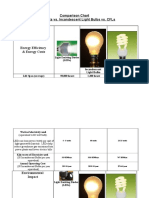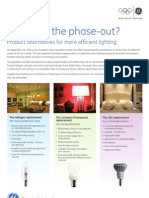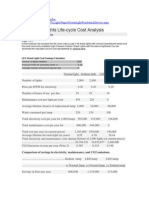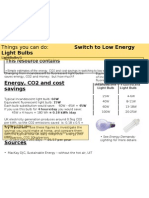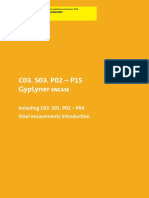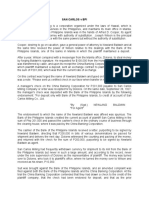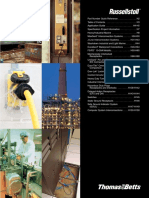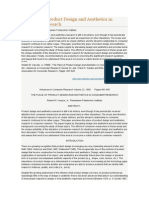Lighting Comparison Chart PDF
Lighting Comparison Chart PDF
Uploaded by
paul_aldCopyright:
Available Formats
Lighting Comparison Chart PDF
Lighting Comparison Chart PDF
Uploaded by
paul_aldOriginal Title
Copyright
Available Formats
Share this document
Did you find this document useful?
Is this content inappropriate?
Copyright:
Available Formats
Lighting Comparison Chart PDF
Lighting Comparison Chart PDF
Uploaded by
paul_aldCopyright:
Available Formats
Comparison Chart
LED Lights vs. Incandescent Light Bulbs vs. CFLs
Energy Efficiency
& Energy Costs
Light Emitting Diodes Incandescent Compact
(LEDs) Light Bulbs Fluorescents
(CFLs)
Life Span (average) 50,000 hours 1,200 hours 8,000 hours
Watts of electricity used
(equivalent to 60 watt bulb).
LEDs use less power (watts) per unit of light 6 - 8 watts 60 watts 13-15 watts
generated (lumens). LEDs help reduce
greenhouse gas emissions from power plants
and lower electric bills
Kilo-watts of Electricity used
329 KWh/yr. 3285 KWh/yr. 767 KWh/yr.
(30 Incandescent Bulbs per year equivalent)
Annual Operating Cost
$32.85/year $328.59/year $76.65/year
(30 Incandescent Bulbs per year equivalent)
Environmental
Impact
Light Emitting Diodes
(LEDs) Incandescent Compact
Light Bulbs Fluorescents
(CFLs)
Yes - Mercury is very toxic to your
Contains the TOXIC Mercury No No
health and the environment
No - contains 1mg-5mg of Mercury
RoHS Compliant Yes Yes and is a major risk to the
environment
Carbon Dioxide Emissions
(30 bulbs per year)
451 pounds/year 4500 pounds/year 1051 pounds/year
Lower energy consumption decreases: CO2
emissions, sulfur oxide, and high-level nuclear
waste.
http://www.designrecycleinc.com/led comp chart.html 1 of 2
Important Facts
Light Emitting Diodes Incandescent Compact
(LEDs) Light Bulbs Fluorescents
(CFLs)
Yes - may not work
under negative 10
Sensitivity to low temperatures None Some degrees Fahrenheit or
over 120 degrees
Fahrenheit
Sensitive to humidity No Some Yes
On/off Cycling
Switching a CFL on/off quickly, in a Yes - can reduce
No Effect Some
closet for instance, may decrease lifespan drastically
the lifespan of the bulb.
No - takes time to warm
Turns on instantly Yes Yes
up
Not Very Durable - glass
Very Durable - LEDs can handle Not Very Durable - glass
Durability or filament can break
jarring and bumping can break easily
easily
Heat Emitted 3.4 btu's/hour 85 btu's/hour 30 btu's/hour
Yes - may catch on fire,
Failure Modes Not typical Some
smoke, or omit an odor
Light Output
Light Emitting Diodes Incandescent Compact
(LEDs) Light Bulbs Fluorescents
(CFLs)
Lumens Watts Watts Watts
450 4-5 40 9-13
800 6-8 60 13-15
1,100 9-13 75 18-25
1,600 16-20 100 23-30
2,600 25-28 150 30-55
http://www.designrecycleinc.com/led comp chart.html 2 of 2
You might also like
- HowtolaunchguidedmathDocument54 pagesHowtolaunchguidedmathapi-505508184100% (1)
- Comparison Chart LED CFL ILDocument5 pagesComparison Chart LED CFL ILver_at_workNo ratings yet
- Comparison Chart LED CFL ILDocument5 pagesComparison Chart LED CFL ILver_at_workNo ratings yet
- Lamp Presentation PptDocument25 pagesLamp Presentation PptPranit BhosaleNo ratings yet
- Comparison Chart Led Lights vs. Incandescent Light Bulbs vs. CflsDocument6 pagesComparison Chart Led Lights vs. Incandescent Light Bulbs vs. CflsPankaj ShidurkarNo ratings yet
- LED Bulbs vs. CFL Bulbs vs. Incandescent BulbsDocument8 pagesLED Bulbs vs. CFL Bulbs vs. Incandescent BulbsMajed ShaikhNo ratings yet
- Comparison Chart Led Lights vs. Incandescent Light Bulbs vs. CflsDocument3 pagesComparison Chart Led Lights vs. Incandescent Light Bulbs vs. CflsMayank SinghNo ratings yet
- Energy Efficiency & Energy Costs: Comparison Chart Led Lights vs. Incandescent Light Bulbs vs. CflsDocument2 pagesEnergy Efficiency & Energy Costs: Comparison Chart Led Lights vs. Incandescent Light Bulbs vs. Cflspditzel8599No ratings yet
- Comparison Chart LED CFL ILDocument5 pagesComparison Chart LED CFL ILVer BautistaNo ratings yet
- WWW Designrecycleinc Com Led Comp ChartDocument2 pagesWWW Designrecycleinc Com Led Comp Chartrsiva98No ratings yet
- CFL vs. Led: A Few More Facts: CflsDocument5 pagesCFL vs. Led: A Few More Facts: CflsAira VeniceNo ratings yet
- Electrical Power Utilization - Leds: Guide: Dr. S.S. BhattDocument44 pagesElectrical Power Utilization - Leds: Guide: Dr. S.S. BhattAbhilash MallikarjunaNo ratings yet
- 5LsOfLighting One PagerDocument1 page5LsOfLighting One PagermarbyNo ratings yet
- Energy Efficiency: LightingDocument23 pagesEnergy Efficiency: LightingdomingoNo ratings yet
- Think Led Product CatalogueDocument12 pagesThink Led Product Catalogueinfo7390No ratings yet
- Tungsten Halogen Lamp - Working Principle, Spectrum & Construction PDFDocument1 pageTungsten Halogen Lamp - Working Principle, Spectrum & Construction PDFMalikNo ratings yet
- Led Fundamentals: Luminous EfficacyDocument10 pagesLed Fundamentals: Luminous EfficacyKalp KartikNo ratings yet
- K Comparison - Between - LED - CFL - BulbDocument1 pageK Comparison - Between - LED - CFL - BulbWeldush AtsbhaNo ratings yet
- Lighting LectureDocument48 pagesLighting LectureHesham MaaroufNo ratings yet
- "Energy Saved Is Equivalent To Energy Produced": Chapter 1-IntroductionDocument33 pages"Energy Saved Is Equivalent To Energy Produced": Chapter 1-IntroductionRamyata MahajanNo ratings yet
- Led Bulbs CatalogueDocument30 pagesLed Bulbs CatalogueleedarsonlightingNo ratings yet
- Parkyn 2005Document12 pagesParkyn 2005Drifter RichardsonNo ratings yet
- Comparison Chart Led Lights vs. Incandescent Light Bulbs vs. CflsDocument4 pagesComparison Chart Led Lights vs. Incandescent Light Bulbs vs. CflsK Vijay Bhaskar ReddyNo ratings yet
- Luma ProDocument37 pagesLuma Proprrerak kaneriaNo ratings yet
- Chapter 6Document64 pagesChapter 6shankaravathanaaNo ratings yet
- Lighting LectureDocument39 pagesLighting LectureOral LeeNo ratings yet
- Reyes Vallerie 9 ST Elizabeth. Tle Act 3Document4 pagesReyes Vallerie 9 ST Elizabeth. Tle Act 3Euniz ReyesNo ratings yet
- Types of LightsDocument6 pagesTypes of LightsAlfred Harvey ElacionNo ratings yet
- Phase Out Brochure GEDocument2 pagesPhase Out Brochure GEJeff GibsonNo ratings yet
- LED Vs Fluorescent Tubes - Comparison in Energy Consumption, Lighting Performance & EfficiencyDocument4 pagesLED Vs Fluorescent Tubes - Comparison in Energy Consumption, Lighting Performance & EfficiencydikshaNo ratings yet
- LightingDocument10 pagesLightingMohan Kumar DuraisamyNo ratings yet
- Katalog Automotive 2011Document21 pagesKatalog Automotive 2011anna annaNo ratings yet
- 02 - Izvori SvjetlaDocument23 pages02 - Izvori SvjetlaRanko SkansiNo ratings yet
- A Detailed Review On Types of Lamps and Their ApplicationsDocument7 pagesA Detailed Review On Types of Lamps and Their Applicationsmanoish07No ratings yet
- Electrical SystemDocument20 pagesElectrical SystemAgalya ChamyNo ratings yet
- Energy Saving Tube LightDocument18 pagesEnergy Saving Tube LightJude Rahul Mathew67% (6)
- Catagories Led Incadescent: 50,000 Hours 1,200 Hours 6 - 8 Watts 60 Watts 329 Kwh/Yr. 3285 Kwh/Yr. 1645 16425Document2 pagesCatagories Led Incadescent: 50,000 Hours 1,200 Hours 6 - 8 Watts 60 Watts 329 Kwh/Yr. 3285 Kwh/Yr. 1645 16425Sayantan RoyNo ratings yet
- Comparison of Light Efficiencies Between High Intensity Discharge (HID) and Light Emitting Diodes (LED) LightsDocument3 pagesComparison of Light Efficiencies Between High Intensity Discharge (HID) and Light Emitting Diodes (LED) LightsPremier PublishersNo ratings yet
- Compared with Fluorescent-Competitive Advantages-lvd induction lamp-hongyuan lightingDocument1 pageCompared with Fluorescent-Competitive Advantages-lvd induction lamp-hongyuan lightingRoberto AlladoNo ratings yet
- Lecturer/ ArchitectDocument44 pagesLecturer/ ArchitectAditi NeupaneNo ratings yet
- Public Lighting GuideDocument15 pagesPublic Lighting GuideRicardoCoelhoNo ratings yet
- The Transition To Led Illumination: A Case Study On Energy ConservationDocument5 pagesThe Transition To Led Illumination: A Case Study On Energy ConservationTarun ImandiNo ratings yet
- Compact Fluorescent Lamps Are Particularly Small Energy-Savings Lamp Are DesignatedDocument5 pagesCompact Fluorescent Lamps Are Particularly Small Energy-Savings Lamp Are DesignatedgoitomNo ratings yet
- Seminar On LEDDocument25 pagesSeminar On LEDOPEYEMI FIADE100% (1)
- SL DesignDocument3 pagesSL DesignJer A' MealNo ratings yet
- Your Guide To More Efficient and Money-Saving Light Bulbs: It's As Easy As 1, 2, 3Document2 pagesYour Guide To More Efficient and Money-Saving Light Bulbs: It's As Easy As 1, 2, 3Atish KissoonNo ratings yet
- Brosur Lampu LEDDocument17 pagesBrosur Lampu LEDEko Yuli Sulistiono0% (1)
- What Is Useful Life For White Light Leds? Lighting Research CenterDocument12 pagesWhat Is Useful Life For White Light Leds? Lighting Research CenterAbigail RamosNo ratings yet
- Electric Lighting Sources: Illumination and AcousticsDocument40 pagesElectric Lighting Sources: Illumination and AcousticsVenkat MuraliNo ratings yet
- 1.2. Lighting Terminology 1.3. Electric Lighting Sources 1.4. Luminaires Mounting 1.5. Lighting Distributions 1.6. Lighting Design 1.7. Lighting Control 1.8. Lighting Symbols in Technical DrawingsDocument49 pages1.2. Lighting Terminology 1.3. Electric Lighting Sources 1.4. Luminaires Mounting 1.5. Lighting Distributions 1.6. Lighting Design 1.7. Lighting Control 1.8. Lighting Symbols in Technical DrawingsZelalemNo ratings yet
- T LightBulbsDocument1 pageT LightBulbsjwn27No ratings yet
- Designing With Leds: Review: Intellitube LED T8 Lamp Works With/without BallastDocument5 pagesDesigning With Leds: Review: Intellitube LED T8 Lamp Works With/without Ballastmrbhala3124No ratings yet
- Types of LightDocument14 pagesTypes of LightAniket WayalNo ratings yet
- Led Guide: Property Guru and LED Hut Join ForcesDocument16 pagesLed Guide: Property Guru and LED Hut Join ForcesGarryNo ratings yet
- Lighting Materials and FixturesDocument11 pagesLighting Materials and FixturesMichael Root100% (1)
- EEE SolutionDocument143 pagesEEE SolutionJannatul AdninNo ratings yet
- Report 2Document16 pagesReport 2Lalinjaman L MarionNo ratings yet
- 8 To 22 Lumens Per Watt 120 Lumens 1,000 HoursDocument4 pages8 To 22 Lumens Per Watt 120 Lumens 1,000 HoursLloyd MalingiNo ratings yet
- 8 To 22 Lumens Per Watt 120 Lumens 1,000 HoursDocument4 pages8 To 22 Lumens Per Watt 120 Lumens 1,000 HoursLloydNo ratings yet
- LED Lighting for Your Home & Business: LED Lights Save Money and Make Your Home Lighting SpectacularFrom EverandLED Lighting for Your Home & Business: LED Lights Save Money and Make Your Home Lighting SpectacularNo ratings yet
- LED Lighting for your Home & Business: LED Lights Save Money and Make Your Home Lighting SpectacularFrom EverandLED Lighting for your Home & Business: LED Lights Save Money and Make Your Home Lighting SpectacularRating: 4 out of 5 stars4/5 (1)
- 09 Retail ManagementDocument32 pages09 Retail ManagementAppu SpecialNo ratings yet
- White Book C03 S03 Steel Encasements GypLyner ENCASEDocument20 pagesWhite Book C03 S03 Steel Encasements GypLyner ENCASEPavaloaie Marian ConstantinNo ratings yet
- Week 2Document26 pagesWeek 2Jared BresslerNo ratings yet
- LEVEL III - ATA 25 Equipment - FurnishingDocument72 pagesLEVEL III - ATA 25 Equipment - Furnishingwagdi0% (1)
- BCSL44 Short NotesDocument2 pagesBCSL44 Short Notessahil vermaNo ratings yet
- Rediet Effect of Marketing Strategy Practice On Organizational PerformanceDocument12 pagesRediet Effect of Marketing Strategy Practice On Organizational PerformanceEndalk AragawNo ratings yet
- EE3004Document1 pageEE3004ashishNo ratings yet
- FFFFFFDocument6 pagesFFFFFFkenethwaiswa77No ratings yet
- V.V.N.K.M.SR - SEC.SCHO OL: ANALYTICAL PARAGRAPH (Sample Questions)Document5 pagesV.V.N.K.M.SR - SEC.SCHO OL: ANALYTICAL PARAGRAPH (Sample Questions)amone nNo ratings yet
- CD#0020 - Search and Rescue: Assessment Chapter - 38 QuestionsDocument3 pagesCD#0020 - Search and Rescue: Assessment Chapter - 38 QuestionsNick Fox100% (1)
- SAN CARLOS MILLING v. BPIDocument2 pagesSAN CARLOS MILLING v. BPIKaren Ryl Lozada BritoNo ratings yet
- Chapter 2Document43 pagesChapter 2Sintayehu DerejeNo ratings yet
- Payment Methods: Open AccountDocument3 pagesPayment Methods: Open AccountKatia GoncharNo ratings yet
- Trelleborg TM900 ENG LRDocument8 pagesTrelleborg TM900 ENG LRMárton SzőkeNo ratings yet
- Peran Pancasila Dalam Menumbuhkan Kesadaran Nasionalisme Dan Patriotisme Generasi Muda Di Era GlobalisasiDocument6 pagesPeran Pancasila Dalam Menumbuhkan Kesadaran Nasionalisme Dan Patriotisme Generasi Muda Di Era GlobalisasiIIS WULANDA Mahasiswa PNJNo ratings yet
- UNIT II Lesson 2 (Communication and Technology)Document4 pagesUNIT II Lesson 2 (Communication and Technology)Photz Bayangan Katab100% (2)
- Lim Tong Lim vs. Philippine Fishing Gear Industries, Inc.Document3 pagesLim Tong Lim vs. Philippine Fishing Gear Industries, Inc.zealous9carrotNo ratings yet
- ACI-350 P-M Interaction 2.1Document17 pagesACI-350 P-M Interaction 2.1Franklyn P. GenoveNo ratings yet
- Cemex Holdings Philippines Annual Report 2016 PDFDocument47 pagesCemex Holdings Philippines Annual Report 2016 PDFFritz NatividadNo ratings yet
- RSH Qam11 Ism Ch01Document7 pagesRSH Qam11 Ism Ch01James MorganNo ratings yet
- Runtime Application Self Protection RASPDocument3 pagesRuntime Application Self Protection RASPAbhijeet MishraNo ratings yet
- Hydraulic Fracturing (Also Fracking, Fraccing, Frac'ing, Hydrofracturing or Hydrofracking) IsDocument1 pageHydraulic Fracturing (Also Fracking, Fraccing, Frac'ing, Hydrofracturing or Hydrofracking) IsAnonymous QM0NLqZONo ratings yet
- The Oas Gazette February 2024Document67 pagesThe Oas Gazette February 2024bighnarajmahakur9No ratings yet
- Russellstoll (Thomas and Betts)Document151 pagesRussellstoll (Thomas and Betts)fabikduqueNo ratings yet
- Introduction To Computers: Hardware and SoftwareDocument31 pagesIntroduction To Computers: Hardware and SoftwareYsa DienteNo ratings yet
- The Place of Product Design and Aesthetics in Consumer ResearchDocument8 pagesThe Place of Product Design and Aesthetics in Consumer ResearchnmbarreiraNo ratings yet
- Loadmaster 800i/8000i: On-Board Weighing SystemDocument22 pagesLoadmaster 800i/8000i: On-Board Weighing SystemDavid Lortes LiñaresNo ratings yet
- Classroom Objects - Grade 2Document3 pagesClassroom Objects - Grade 2Rochel Frances AcebronNo ratings yet
- Intro To PolyurethaneDocument26 pagesIntro To PolyurethaneKatie Ramirez100% (4)








